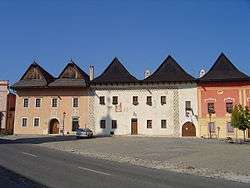Town privileges
Town privileges or borough rights were important features of European towns during most of the second millennium.
Judicially, a borough (or burgh) was distinguished from the countryside by means of a charter from the ruling monarch that defined its privileges and laws. Common privileges involved trade (marketplace, the storing of goods, etc.) and the establishment of guilds. Some of these privileges were permanent and could imply that the town obtained the right to be called a borough, hence the term borough rights (German Stadtrecht, Dutch stadsrechten). Some degree of self-government, representation by diet, and tax-relief could also be granted. Multiple tiers existed; for example, in Sweden, the basic royal charter establishing a borough enabled trade, but not foreign trade, which required a higher-tier charter granting staple right.
See also
- German town law
- Kulm law
- Lübeck law
- Magdeburg rights
- Confoederatio cum principibus ecclesiasticis
- City rights in the Low Countries
- City status in the United Kingdom
- Town privileges in Sweden
- Imperial free city
- Scottish Burgh
